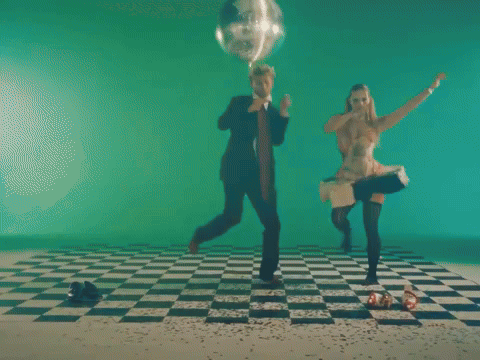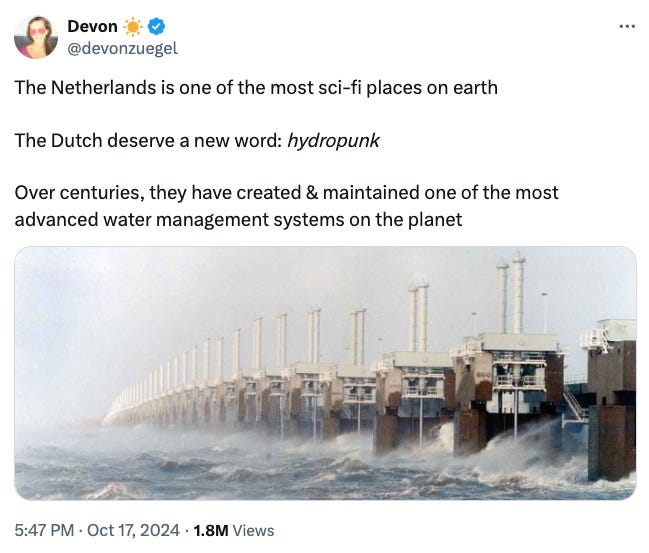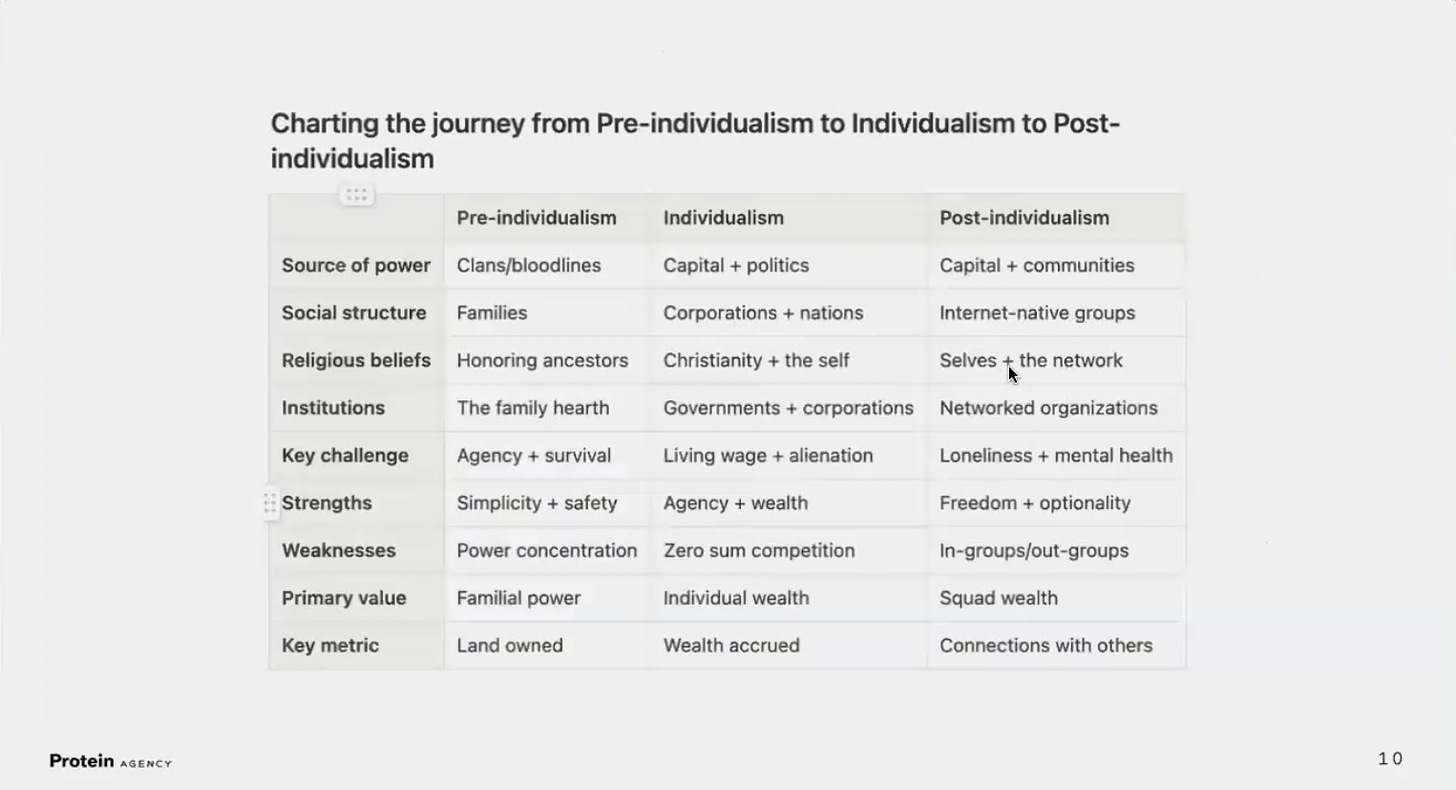📍✨The Nexialist #0196
good place | hydropunk | arboreal codes | decoding birdsong | dog | post-individualism | the state of community | perfect stranger | sorry i’m late, i didn’t want to come
welcome to your weekly smoothie shot high in bytes, the nexialist
hey you! i hope this message finds your neurons dancing like so! this week, you can hear me in the good place podcast, which i’m simultaneously shy and excited about (more about it below). in this edition we talk about community, trees & birds & dogs, post-individualism and becoming a screen. enjoy! 🫀✨
1 year ago » 🏢✨The Nexialist #0144 : the cult of the occult | black eye | my animal | the devil of your story | eudaimonia machine | consultancy horror story | chemical colonization | the city will kill me | tokyo calling
2 years ago » 🗳️✨The Nexialist #0092 : Lula, explained | honest gov ad | the state of democracy 2022 | imillaskate | the queer code | success isn’t linear | hot mess | i drink wine
3 years ago » i was taking a break
📍good place
well, i think this is the first time i join a podcast on a more personal level (also it’s only my third time on a podcast, so forgive me for the uhhs and ahhs and any repetitions). thanks to my pequena eva, robin cox who makes the good place podcast contacted me for a nice chat on a bench about life, what a good place is and whatever else we wanted. the conversation flowed very well, and i’m happy we got to talk about different things, like relationships, family, social health and of course, my home, amsterdam. the episode link is on spotify is here.
brainsparks: third places (tn#90), amsterdam archive (tn#188), amsterdam’s green standards (tn#131), that amsterdam photo (tn#122), traffic: conflict or dance (tn#88), social health (tn#179), artificial intimacy (tn#168), social infrastructure (tn#15), envisioning cities (tn#183)
🌊hydropunk
thank you,
for sending this nexialist-worthy content (which i also mention on the interview above). you know how much i love all the different sci-fi niches and _punks, so i was obsessed when i read this thread. i like to say the dutch are water benders, but the hydropunk fits like a glove. there is this old saying that goes “God created the world but the Dutch created the Netherlands," and it’s exactly about this. terraforming on earth.brainsparks: how the dutch beat the ocean (tn#173), cyberpunk, cypherpunk, solarpunk and lunarpunk (tn#127)
🌳arboreal codes
now this post recommended at
came on the right time, as i was impressed to learn amsterdam has a database/map of all the trees where you can even report if something happened to a tree (thank you, juan!).my mind was blown with this article by shannon mattern. i had never heard of trees as a property boundaries. and apparently this was done for centuries in different parts of the world, which makes so much sense. then she shows how today, trees have become mere properties, and if someone cuts a tree that doesn’t belong to them (in the u.s. at least), all they need to do is pay for the price of wood, which is so reductive.
Arboreal law – both that addressing trees as markers of landed property and as property themselves – is about capital, colonialism, commemoration, the commons, and community. It’s also based on establishing trees themselves as bodies, as ontological beings, that mediate the relations between human and social bodies – from neighbors to nation-states – in space.
Does the law conceive of a tree as a mere commodity: something to be transformed into lumber or to enhance the market value of a home? Does the law define a tree’s being based on where it derives its sustenance – that is, where its leaves and roots draw sunlight and nutrients from the sky and soil – or by where its trunk happens to rise from the earth? What about the branches and the roots: when they cross a property line, create obstacles for utility companies, or obscure million-dollar views, they seem suddenly to become ontologically separate from the trunk. And what of the leaves and fruits affixed to those branches? Their essentiality to the tree-as-legal-entity seems to depend on whether their crop is on the branch or on the ground. How, then, do we think about the tree’s other incidental properties and capacities: its provision of shade and shelter for multiple species, its production of oxygen, its consumption of carbon dioxide, its capacity to prevent erosion, its contributions to community wellness? Are these properties not part of the tree’s “intrinsic value,” too?
brainsparks: sumaúma(tn#122), more-than-human rights (tn#131), ask nature (tn#86)
🦜decoding birdsong
one of my favorite uses for ai is the decoding of animal communication, because it forces us to accept how we underestimated their intelligence (and overestimated ours). it is still a work in progress and far from a rosetta stone, but it seems so promising and exciting.
Rivka Galchen shows works from different scientists, and i loved the work of Kleindorfer. being a woman in science, she showed how female birds also sing (contrary to what she had learned), and how birds learn their language while still in the egg. that’s quite amazing!
Kleindorfer also studied the superb fairy wren, a songbird that weighs about as much as a walnut and sports a flirty, upright tail. Despite their fanciful names, fairy wrens are commonplace in Australia. They are socially monogamous but sexually promiscuous—they are essentially in open marriages—and they bring up their young collectively. Arguably, they have even more to chat about than geese do. Fairy-wren nests are about the size of cupped human hands, built to contain pale, speckled eggs that are smaller than thumbnails. Kleindorfer and her team wired up nests with cameras and microphones and soon discovered something that they hadn’t known to look for. “The mothers in nests were producing an incubation call—a call to the eggs,” she told me. It was like a lullaby. Why would a mother bird make any sound that could attract predators to the nest? “Songbird embryos don’t have well-developed ears, so this was completely unexpected,” she said. “That started a twenty-year project—why is she calling to the eggs?”
The team compared incubation calls to the begging calls of young chicks. “It was very odd,” Kleindorfer recalled. “Each nest had its own distinct begging call.” What’s more, each begging call matched an element from the mother’s incubation call. This suggested, startlingly, that birds could learn a literal mother tongue while still in ovo. (Humans do this, too; French and German babies have distinct cries.) Even “foster” chicks, who as eggs were physically moved from one nest to another, learned begging calls from their foster mothers, rather than from their genetic mothers. This was big news in the ornithology world. “The paradigm of how songbirds learn—after hatching, from their father’s song—was overthrown,” she said. The same process was soon documented in more songbird species.
brainsparks: ai to talk to animals (tn#185), lessons in birdwatching (tn#194), do you speak whale? (tn#20), non-human perceptions + umwelt (tn#86), scientist (tn#169)
🐶dog
this is such a cutsey dancey song! if i had a dog i would sing the chorus to him/her every day. this is what i pay internet for, really.
brainsparks: doggos (tn#34), top dog (tn#117), clown in mainstream (tn#181)
👤post-individualism
“once upon a time people were born into communities and had to find their individuality. today people are born individuals and have to find their communities” —k-hole, youth mode (2014)
from the
, this is forum about post-indivualism is full of brainsparks. we are hearing a lot about the loneliness pandemic and the impact of living in an individualistic society, but there seem to be some signals pointing towards post-individualism. community, authenticity, multitude of the self, irl x virtual, capitalism are some themes i remember from the top of my mind.it’s my second time hearing Yancey Strickler from Metalabel, and he’s got so much insight into community and culture. i didn’t know Kei Kreutler from Other Internet, and Jack Self from Real Review, and they both added quite critical layers and provocations. when they talk about how we got here, it’s quite mindblowing.
-Yancey defines the post-individual experience as happening "when someone accepts their individuality, but feels called for a variety of reasons (social, creative, metaphysical, financial) to seek greater meaning and context with others."
-Identity after the internet, and the relationship between memory and identity. Kei believes we're living through a a "spam renaissance" and in 5 years' time, we might not be able to remember what it means to be a human online.
-The relationship between post-individualism and capitalism, and Jack's concept of "Playlist Personalities". According to Jack, the proliferation of identities on the internet are mainly there to create products and sell you stuff.
brainsparks: digiphrenia (tn#191), dark forest theory (tn#10), the lifespan of loneliness (tn#159), witches and loneliness (tn#98), culture of proximity (tn#25)
🫂the state of community
i hate to say it, but i thought tumblr was dead (it did die when it banned any sort of nudity together with pornography). but recently they released a report about the state of community in partnership with archirival, a youth culture agency. first, i love the navigation. i started it quite skeptical, because it is a report for marketers on how social media has become antisocial for genz, and guess who that is to blame? 🤷 but then i understood it is a bit of a slap on the wrist, with some reasonable takeaways. i also brought an index of the items so you can read the full report if you want:
Broken social scenes: Marketers are waking up to a hard truth: social media’s once-unrivaled grip on young audiences is starting to slip. As platforms drown in endless content and shallow interactions, Gen Zs are pulling back, seeking something deeper — and throwing a wrench in marketing’s best-laid plans.
Network Effect: As major social media platforms fall short of offering the authentic connections Gen Z crave, Zs are building a new interwoven landscape of “in” groups that build belonging through an overlapping web of intimacy, exclusivity, and IRL.
New Rules of Influence: Gen Z is rewriting the rules of influence, and shifting the focus from followers to genuine connections. From peers and employees to community-driven creators, influencers that can build trust and meaningful engagement across multiple platforms are the ones drawing Zs in.
Takeaways:
-Community building has to be holistic
-Engage cliques over clicks
-Relevance > Influence
-Touch grass
-Co-create togehter
brainsparks: dirty words: community (tn#129), decoding community (tn#121), the hidden networks of everything (tn#126), enshittification lifecycle (tn#106), non-toxic social media (tn#121), Business Needs New Frameworks (tn#68)
👠perfect stranger
i’m completely obsessed with fka twig’s new single, perfect stranger. the song is addictive, and the visuals are just incredible, i love her vision and her dancing, always on point. also, nice to see cameos of people like Yves Tumor and Phoebe Waller-Bridge.
brainsparks: eusexua (tn#191), the body is art (tn#192)
🤳sorry i’m late, i didn’t want to come
i’m not familiar with the wombats, but this song title is genius. yes, this line went viral some years ago, but making a song about it is on another level. i loved the idea of the video where the protagonist becomes the screen. i feel sometimes i’m so long in front of a screen, that i’m a brain with a screen, as if i’m more on the screen than being present in my body. have you ever felt that?
Sorry I’m late, I didn’t want to come
It's not that I hate you
I just hate everyone
I don't want to socialise
Unless I’m getting numb
Sorry I’m late, I didn’t want to come
brainsparks: wishy-washy (tn#98)
see you next week, perfect strangers 🫀✨
❓Wait, what is a Nexialist?
🔎If you want to see what I’ve already posted, visit the archive and use the search engine. Even I do that a lot.
💌I want to know what you think/who you are! Your feedback is highly appreciated; you can e-mail me or fill in this short survey. Thank you! 🙏🏻
🔌Let’s Collab?
I truly believe innovation comes from bringing improbable areas together, and that’s why I called this project The Nexialist. Some sectors are known to be self-referencing and hermetic. Sometimes, teams are on autopilot mode, focused on the daily grind, which hinders innovation. As a Nexialist, I like to burst these bubbles, bringing references from different areas, and maintaining teams inspired and connected to the Zeitgeist.
I offer inspiration sessions called Brainsparks, creative desk research (Zeitgeist Boost), Plug’n’Play deals for workshops and sprints, and other bespoke formats. If you want to know more about this, send me an e-mail with your challenge(s) and we can figure something out together. Check out my website and some work I’ve done below:










Você é o maioral, obrigada por trazer tantas fontes fodas de pesquisa, já havia me deparado com o termo pós-individualismo há uns anos atrás, mas hoje, trabalhando como CM e cada vez mais obcecada por entender todo esse movimento de comunidades, que é uma nova era vindo aí, caiu como uma luva ter reencontrado esse termo, vou quebrar cabeça, escrever e falar horrores sobre isso agora, obrigada divo <3
Thanks for the mention!